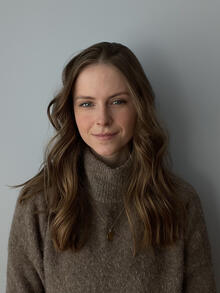Introducing Kate
 Kate Posluszny completed an Honours Bachelor in Kinesiology (HBKin.) from Wilfrid Laurier University in 2020, followed by a Master of Science (MSc.) in Kinesiology from Lakehead University in 2022, before beginning her doctoral studies in Kinesiology (biomechanics stream) here at the University of Waterloo. She is a graduate student researcher in the University of Waterloo’s Occupational Biomechanics and Ergonomics Lab (OBEL), supervised by Dr. Steve Fischer, where her research is founded in occupational health and safety, ergonomics, and biomechanics, with interest surrounding the use of wearable technology to monitor and assess the risk of workplace injuries.
Kate Posluszny completed an Honours Bachelor in Kinesiology (HBKin.) from Wilfrid Laurier University in 2020, followed by a Master of Science (MSc.) in Kinesiology from Lakehead University in 2022, before beginning her doctoral studies in Kinesiology (biomechanics stream) here at the University of Waterloo. She is a graduate student researcher in the University of Waterloo’s Occupational Biomechanics and Ergonomics Lab (OBEL), supervised by Dr. Steve Fischer, where her research is founded in occupational health and safety, ergonomics, and biomechanics, with interest surrounding the use of wearable technology to monitor and assess the risk of workplace injuries.
Conducting graduate research
Kate’s experience with graduate research has included a focus on completing research within the field, but she has also worked at simulating fieldwork within the lab. In addition to her own research, Kate also works collaboratively, supporting her lab mates’ research projects.
Reflecting back on the experience transitioning from conducting research at an undergraduate level to a graduate level, Kate found, as expected, that her independence to conduct research increased, meaning she needed to be able to teach herself about her research topic. Kate describes, "Essentially, the more research you conduct, the less guidance you should be given. A supervisor’s overall goal is to help train you to conduct research on your own, and therefore, will progressively reduce their involvement/guidance in your research". This made her realize the importance of being truly interested in her research projects, as she learned more from the experience when she was truly invested and interested. Choosing a lab that is a good fit, is also something that Kate has realized is important to supporting the learning experience as a researcher, as each lab has different mentoring styles and areas of expertise.
As she discusses her graduate research experience Kate continues to focus on it as a learning experience – no matter how experienced of a researcher you are! She says, “with every project, you gain experience and exposure in conducting/performing research”. As Kate knows, some of these experiences can be more challenging than others, particularly when using technology for research. This requires a watchful eye in order to identify errors with equipment or technology, and Kate says, “it’s important to have an idea of the potential problems that can occur and ways to overcome them”. In addition to errors coming from technology, Kate also acknowledges “it is also common and easy to make mistakes and that is okay”. What is important as researchers, she explains, is to “learn from these mistakes, which will subsequently improve future research and data collection”. Through her graduate research opportunities, Kate has been able to see what worked or did not, how to conduct efficient work, and has learned from lab mates and other researchers.
Advice to other students
For other students engaged in graduate research, Kate has lots of great advice based on her experiences. First, she recommends taking advantage of the textbooks and books available on how to do certain analyses, which has helped her immensely. She encourages students to use the manuals and guides on how to use software and how to write in different forms of scientific writing. She also encourages other students to treat graduate work like a 9-to-5 job and take breaks as needed because it will help build consistency and progress.
Finally, Kate highly recommends building and relying on your network. Being transparent and speaking up about help that is needed has greatly benefited Kate, and she has found that most people are “more than happy to help out”! Building connection with supervisors, lab mates and classmates is also so important, as Kate has found discussing her ideas and thoughts with others can be crucial to refining ideas or developing new ones. Overall, she says, “often great things come from some sort of collaboration”.









